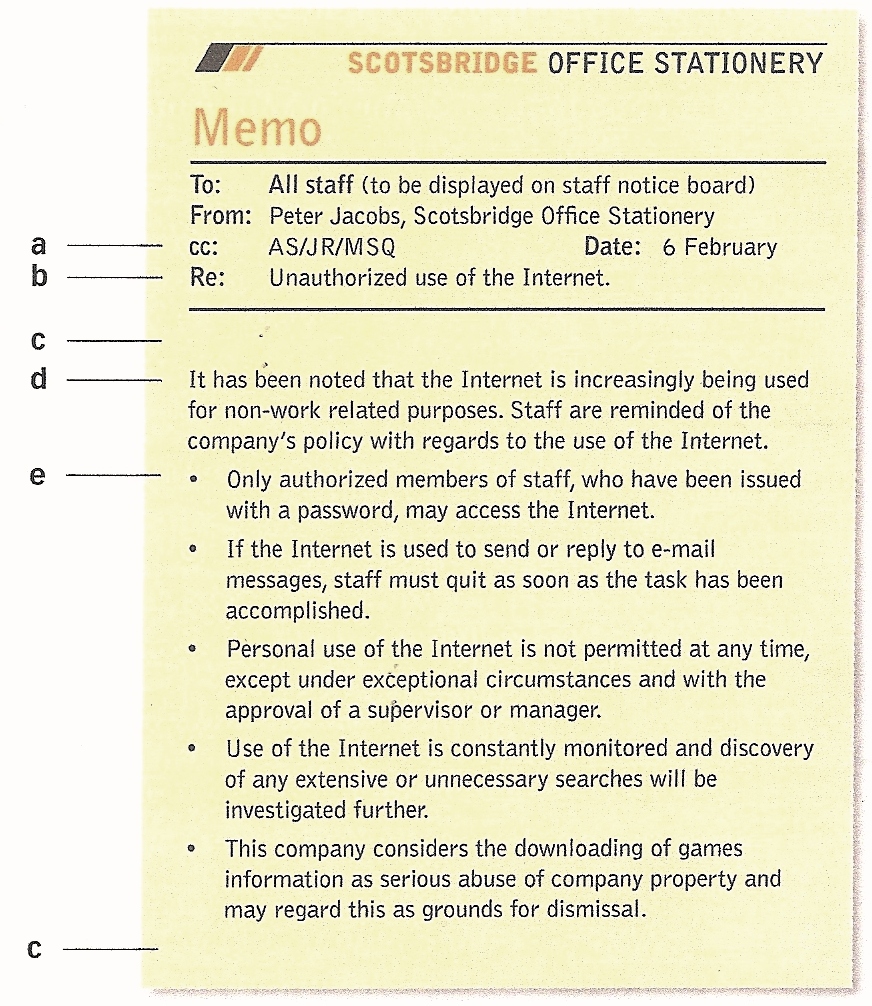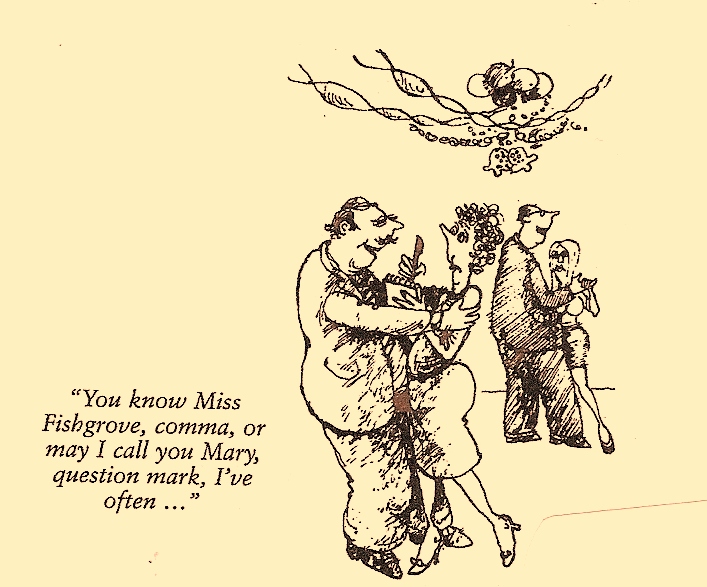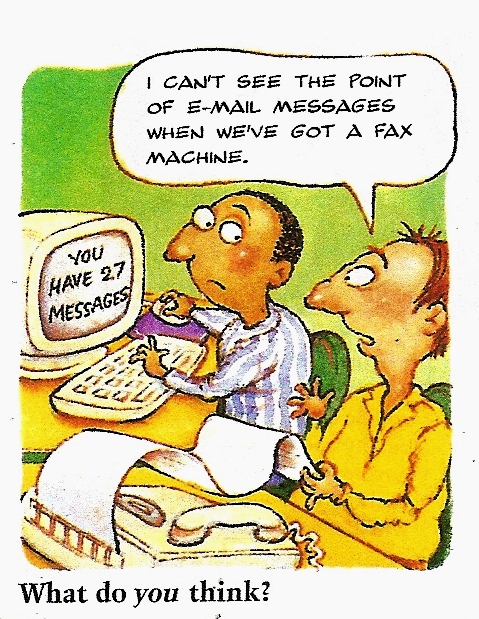
- •Improving Communications
- •Oral communications
- •Written communications
- •7 Tips to become a Good Conversationalist
- •Six Common Mistakes That Spoil Conversations
- •1. Blabbermouthing
- •2. The "take-away" and "me-too" syndrome
- •3. Unsolicited advice
- •4. Interrupting
- •5. Contradicting
- •6. Stingy contributors
- •8 Правил знайомства з діловими партнерами
- •18 Ways to improve your body language
- •6 Чарівних букв
- •Voice and Language
- •Visual aids
- •Fail to prepare
- •No weak opening
- •When I know I have to make a presentation, even a small one before a very limited number of people, I start feeling nervous…
- •When a big meeting is coming up, one that will involve a number of presentations from a range of people…
- •I would say my ability as a presenter is…
- •While I am up on stage, I…
- •Comments about my presentations are generally…
- •If I have to go “off the cuff”…
- •If I could describe public speaking as a food, it would be…
- •Visual aids versus handouts
- •Я к вдало провести ділову зустріч.
- •Introducing the Agenda
- •Introducing the First Item on the Agenda
- •1. What is the desired outcome of the meeting? (How will you know the meeting was successful?)
- •2. Who needs to be there? (And who doesn’t?)
- •3. Is the agenda prepared? (If not now, when?)
- •4. What can I do to prepare? (How can I help others prepare?)
- •5. What can I do to make this meeting succeed? (What is my responsibility?)
- •Discuss the following questions:
- •Exercise 6
- •Negotiating
- •Well, we could make it 7,5 % .
- •The trouble is, the general manager isn't very interested in marketing. He's only concerned about …..5…... If you make it 10%, I might be able to persuade him.
- •But you said…
- •6 Найпоширеніших помилок при проведенні переговорів
- •Communicating with someone in writing
- •The salutation
- •The subject title
- •The body of the letter
- •The parting
- •The signature
- •Inquiries (Enquiries)
- •Поради при написанні ділових листів
- •……………: Always proofread and edit your letters.
- •Avoid the use of …..1….. Words
- •Informal Style Formal Style
- •Identify yourself, if necessary
- •Include necessary information
- •Ten keys to writing an essay
- •Budget your time carefully
- •Read the topic carefully
- •Plan your essay before you write
- •Be sure your handwriting is as clear and legible as possible
- •Follow a clear, logical organization
- •Topic Type a: Contrast/Opinion
- •Use concrete examples and specific reasons
- •Use signal words to indicate transitions
- •Use a variety of sentence types.
- •Check your essay for errors.
- •Електронна пошта
- •Chief, Guy, Sport
- •My Buddy
- •Assumption Junction
- •Peak-a-Boo
- •2 (Suggested answer)
- •Listening 4
- •Contents
- •References
Informal Style Formal Style
big a buy so-so to send to get to give to show to tell to thank wrong to get better and better to get worse and worse to keep in touch to owe our idea we wanted your letter to us |
substantial a purchase satisfactory to forward, to dispatch to obtain to supply to indicate to inform to be grateful incorrect to improve to depreciate, to decline to keep informed to be in debt, to be obliged to smb the company’s proposal the corporation required the correspondence received
|
2. Rewrite these ‘formula phrases’ in neutral or neutlal-friendly language. In some cases you may produce several alternatives.
We are in receipt of your letter…
Further to you communication of the 15th April, we wish to inform you that …
We are writing with reference to …
Please find enclosed …
Kindly favour us with your comments …
It would be greatly appreciated if you would advise us of your decision …
You are requested to make contact with us at your earlier convenience …
We would be greatly assisted by your early response …
Should you require any further assistance, please do not hesitate to contact us …
No decision has been made regarding the proposed development …
It is proposed to …
I want to make some comments with regard to …
Exercise 6
Read the letter below. Although the order is logical, the language is unnecessary complicated. Rewrite the letter and make it reader-friendly.
Dear Mr. Olafsson
Immediately following receipt of your request for us to act on your behalf to locate appropriate accommodation for one of your managers our standard application form will be dispatched to you. This should be fully completed by you and returned to us without delay.
Exercise 7
Producing a memo
A memorandum, or memo for short, is a note sent within an organization to inform staff. It is one of the most common forms of commercial correspondence.
A. Read the memo. Why do you think it was written?
B. Match the annotations to the correct part of the memo (a-e)
Memos do not begin with Dear …and are usually not signed.
Points are usually introduced with numbers or bullets.
Memos have brief introduction, which comes straight to the point. This states the subject of the memo. This means copies to these people. Often only initials are used.

![]()
Write memos for the staff noticeboard based on these notes
1. You want to send a memo about security. Three members of staff have had money stolen from their offices. Tell staff that they should keep their valuables with them or in a locked drawer, or cupboard at all times. Inform staff that if they see anything suspicious, they should phone security immediately. You want copies to go to Jane Griffiths, Anil Singh, and Giorgio Agostini.
2. You want to send a memo about staffing. You want people to volunteer to work on New Year’s Day. There will be three shifts: from midnight to 8.00 a.m. on New Year’s Day, 8.00 a.m. to 4.00 p.m., and 4.00 p.m. to midnight. You will pay double time (twice the normal rate of pay). You need three people for each shift.
![]()
Exercise 1
Punctuation
1. Match these punctuation marks to their names below.
1) , 2) ! 3) «…» 4) / 5) (…) 6) ? 7) ’ 8) ‘…’ 9) ; 10) : 11) . 12) - 13) ─ |
|
apostrophe brackets/ parentheses colon comma dash exclamation mark full stop/ period hyphen question mark semi-colon single quotes/ inverted commas stroke/ oblique/ slash double quotes/ quotation marks
|
2. Complete these sentences by deciding which punctuation which punctuation mark is ‘explained’ or ‘illustrated’.
The words ‘explained’ or ‘illustrated’ in this sentence are between _________ .
A __________ marks the end of a sentence.
A ___________shows that there is some doubt, doesn’t it? What do you think?
A __________is used for word-division or word-joining.
And it shouldn’t be confused with another ─ longer mark: the ___________ .
This is used to separate ideas or words usually added as an afterthought.
6. When writers wish to express emphasis or even surprise they use the
___________. This is no problem!
7. « ____________are used to show what someone actually said . »
8. Sometimes you may wish to separate two sentences; but they are somehow
closely connected; this is when you can use the ___________instead of the full
stop.
9. NOTE: a ____________can help to emphasize what is coming next: to list things:
reports, letters, memos and so on.
10. If a person wants to show alternatives, he/she can separate them by using a
___________/ ___________/ ____________.
11. And if they are using words (i.e. phrases or expressions) which are not of
primary importance they can be placed between ___________ (____________) .
12. An ____________is used in possessives (Mr. Jones’s) and it is also used in
contractions, isn’t it?
Exercise 2
Find the errors in these sentences and correct them.
Its important, that your punctuation is correct: because incorrect punctuation and Capital Letters Used Wrongly may confuse your readers’
Just like, incorrect spelling incorrect punctuation can be very annoying for your reader who may pay more attention to the mistakes, than to the content of your report or letter.
You probably know, that exclamation marks are not used much in business letters! But they are used in advertisements as well as in notes.
Contracted forms like Ive and weve are a feature of informal writing. They are not found in most reports or business letters which tend to be fairly formal. If in doubt use full forms; I have, we have, etc
It’s usually easier for a reader to understand short simple sentences rather than long complicated one’s.
Exercise 3
Marcella Bianchi has written to a careers adviser who writes for an on-line students’ magazine. Read Marcella’s e-mail letter and punctuate it appropriately. You also need to add line breaks (new paragraphs) and some Capital Letters.
Careers advice - message |
From: Marcella [bianchim@tos.com] Sent 9:19am 10/06/2010 To: careers@onmag.com Cc Subject: Careers advice |
Im twenty years old and in my last year of a business studies course and I have already received the offer of a job with a company where I did a placement last year however I do not really want to accept it as it is an old fashioned firm which doesn’t do much to develop its staff I want to find something which is more forward looking or do you think I am being unreasonable my friends say I am turning down a golden opportunity as the salary is good how can I find out about opportunities in more dynamic organizations before it is too late what do you think I should do |
The careers adviser is dictating the first part of the letter to a computer using voice recognition technology. Write the first paragraph of her reply by listening and following her instructions.
E-mailing Pre-reading
1. Work with your partner and discuss the following questions.
|
|
How important is e-mail in your life? If you did what this businessman did, do you think you might find the same thing?
A friend of mine, a merchant banker, decided that for one month he would turn off his e-mails. When he switched back into gear he found that out of 753 e-mails, ten were really useful. Out of the ten, two were vital – so vital that the senders all took the precaution of ringing to confirm, just in case their e-mails were missed.
According to the Electronic Messaging Association, around seven trillion e-mails are sent annually. How many of them end up in your inbox? And how do you deal with the following problem?
When everybody has e-mail and anybody can send you e-mail, how do you decide whose messages you’re going to read and respond to first and whose you’re going to send to the trash unread?
Is e-mail a time-saver or does it distract you from more important business? Does this company’s idea sound like it could work?
Signs are that the first rush of enthusiasm for e-mail may be waning. One big company in the computing industry is considering banning e-mails in the afternoon. It found that its people had stopped talking to one another.
The institute of Management puts working with computers amongst ‘The Top Ten Stress Factors at Work’. Have you ever resorted to the following?
A survey by Mori reveals that three quarters of computer users shout and swear at their machines. A similar study by IT support company Sosmatic shows that 43% of them have slapped, smacked and even kicked their computer. The mouse is the most maltreated piece of equipment, coming in for 31,5% of the punishment, followed by the monitor, the printer, the hard drive and the keyboard. Over a year such outbursts of ‘computer rage’ can cost companies up to £25,000 in lost earnings and damaged hardware.
According to the novelist Ernest Hemingway, ‘All good writing is rewriting.’ Do you ever rewrite your e-mails? Do you attach the same importance to them as you would to a business letter or is the important thing just to fire them off as quickly as possible?
2. Read the text and do the exercises below.
Writing effective e-mails
|
|
Because business people are extremely busy, it is easy to simply ignore (or even delete) messages that don’t seem urgent or as important as many other things that fight for our attention each day. To help prevent your e-mail message from being ignored or deleted without even having been read, follow the steps outlined below.
Choose your subject carefully
The subject line of your e-mail is of utmost importance, as it is what will determine whether the person reads, files, forwards, ignores, or deletes your e-mail message. Therefore, be specific enough to convey the main purpose of your message in the subject line. For example, don’t just write “Meeting,” but rather “Schedule Meeting to Discuss Upcoming Marketing Seminar.” Also, consider including essential information (such as a response date) in the subject line if you can do so briefly.
Especially with the threat of viruses and other malware, people are less likely to open e-mail messages from people they don’t immediately recognize. Consequently, if the recipient might not immediately recognize your name, you need to choose a subject that is specific, clear, and relevant enough that they will feel that your e-mail is worth the time (and potential risk) of opening.
e.g. |
Reminder: 9 a.m. XML training meeting tomorrow John Doe Firm: Important Project Update XYZ Corporation Handbook Revision: Please Provide Feedback by 2/17 |


